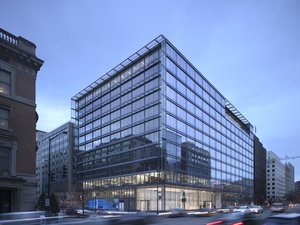
Making the decision to enroll in a coding school or bootcamp is tough. Whether someone is trying to learn a new skill for a current job or maybe looking to go down an entirely new career path, the decision to enroll carries a burden of both time and resources.
In D.C., meetups are filled with people who opted to go to General Assembly or The Iron Yard's courses to learn their coding skills. Programs range from either part-time three-month courses focused on Ruby on Rails or JavaScript to full-time 12-or-13 week immersive courses that require students to attend courses all-day long, with an average commitment being about 70 hours per week with assignments. The cost also isn't cheap. For an immersive at General Assembly, it's $14,500. At Iron Yard, it's $13,900.
Yet the programs receive a lot of criticism from the national tech scene. One example is a Bloomberg article from early December titled "Want a Job in Silicon Valley? Keep Away From Coding Schools." The go-to criticism is that students think they can walk out of a 12- or 13-week course and start making a six-figure salary or come out with the same skill set as a undergraduate computer science student.
But what is it truly like to be in coding school? To look for a new job after leaving a bootcamp? To attend part-time? DC Inno asked a group of D.C. area coding school grads—recent and not-so-recent—about their coding school experience. This is what they said...
Latoya Watson
Recent Fall '16 General Assembly Web Development Immersive grad. Currently applying and interviewing for developer positions.
In her first year of college, Latoya Watson expressed interest in being on the Information Technology track, when an adviser shot her down. "You know, that's the hardest track here. Are you sure you don't want to think about it for a few days?" So, understandably, Watson opted for the seemingly "easier" track: system tech administration.
But the urge to code and build things always stuck with Watson. "Coming to D.C. four years ago, I realized that the community of badass coding women exists," she said. "I was just like 'I want to take control and do what I have wanted to do since first year of college. So I decided to take the leap."
Watson quit her job and had about three-and-a-half weeks before the program started, so when she dove head first into the program, she was ready to fully commit to the curriculum. However, Watson says not everyone in her class had that same sort of flexibility.
"I think they did a good job understanding that there were people with families, for instance. They would give you homework and say you should do your homework, but if you don't...," Watson said. "But ultimately that is all up to you."
Watson said that's also true of the job hunt post-coding bootcamp—what you get is ultimately all up to you.
"It's not a magic pill for your career. You're going to have to go out and meet people. All of the interviews I've gotten were with people I met at meetups," she said.
Mark Brown II
General Assembly part-time courses grad (Front-end Fall 2014 and JavaScript Spring 2016). Current web developer at the Department of Commerce.
While working at the Aspen Institute, Brown found himself updating the website more and more as a part of his job duties. He quickly realized he lacked some of the some of the skills needed to edit certain parts of the site, so Brown decided to take a part-time course at General Assembly, with support from his employer.
Eventually, Brown said, he started editing and updating the website more and more as his love for coding and understanding of the tech world grew. Ultimately, he left his position at the Aspen Institute to be a full-time web developer at the Department of Commerce. "The courses I took at GA taught me that the world of tech is much larger than you think it is," Brown told DC Inno.
Brown opted for the part-time courses at GA, mostly because he wasn't ready to hang his hat on coding and development quite yet. With that, he says his classroom experience is different than the "career-changer" narrative that is almost synonymous with coding school students.
"My classroom experience was really great, and I met a lot of awesome people," Brown said. "I think that GA’s curriculum is good, but I would also say that I maybe the pedagogy could be using a bit of touching up. They know the material and just because of that, it doesn’t mean they should be teaching."
Prior to enrolling, he had tried teaching himself a bit of code for his job, too. Being an independent learner ended up working in his favor at GA: "I recognize that I’m an independent learner, and I’ve done things with Code School and Code Academy and things like that. I didn’t have a teacher and things like that. One of the beauties of GA is having an instructor in front of you," he said.
And for prospective coding school students, Brown has this piece of advice: "We have to dispel this myth that you have to be good at math to be good at coding. I say that as someone who graduated from college with a BA in Theatre and Ethnic Studies," he said. "Do not be intimidated because it’s too math-y and science-y. It’s not like multi-variable Calculus."
Navi Kaur
Completed The Iron Yard's Front End Boot Camp in Fall 2016. Now a developer at Tysons Corner, Va.-based IT Concepts.
Once Kaur decided she would quit her full-time job to learn code full-time, the decision came down to either enrolling in a bootcamp or Master's program. Kaur found herself at a few D.C. area tech meetups, where she met a few Iron Yard grads who told her a bit about their experience. Soon after, she attended a crash course at Iron Yard—a one-day mini-course—and she was sold on the idea of coding bootcamp.
"I wanted to learn with other people who were going through serious life changes," Kaur told DC Inno. "They were making a career change. We were all around the same age except for one guy who was older than us. That was one thing that we all felt in common, we had a similar goal. Especially for me, I definitely latched onto that."
Kaur said being in such an immersive environment taught her a lot about her learning style, which the George Mason University grad didn't really pay attention to in college. "In terms of learning, I’ve always been flexible and open-minded," she said. "It made me a little bit more accepting and flexible with being thrown into a new environment and learning a new language."
Martin Johnson
General Assembly Back-End Web Development part-time course (Summer '14) and Web Development Immersive (Fall '14) grad. Johnson is now a web developer at Alexandria, Va.-based CALIBRE Systems.
Johnson was unemployed after being laid off for several years, and he was struggling to find work in his industry. He opted to retire until he learned more about coding schools. He had done a little bit of programming here, and some programming there, but nothing too intensive. So when he was investigating a few career change options, he came across General Assembly and figured "Why not?"
When his firm downsized and laid him off, he was considered overqualified as a civil engineer to do any sort of design work. "Fortunately, the same problem-solving skills I developed as an engineer helped me to write code," Johnson told DC Inno.
For Johnson, he said making the decision to switch industries was easy, but the execution was difficult.
"Before I began the class, I learned how to type properly. I read books and did online tutorials," he said. "The course was intense as promised, but my classmates and teachers were amazing."
Liza Floyd
Recent Fall '16 Web Development Immersive grad. Currently, she's a front-end web developer at The Washington Post.
Floyd said she's always had an interest in technology on a theoretical basis. But it didn't really cross her mind that she could code professionally. Floyd found herself in fundraising for a few years, and, as she says, she left out of desperation and started bartending for a few years.
On the side, she would code for fun—taking a few classes here and there—until one day it clicked that she could code for a living. "Why is this a hobby? When it clicked, it became obvious that I should be in code," Floyd told DC Inno.
Floyd said throughout the program, instructors continuously repeated that you get out what you put into the course. "It is true. If you're there 75 hours a week, you're going to get a lot more than if you're there 40 hours a week," she said.
Floyd also said it's important for prospective students to know that they aren't going to walk away with a skill set that mirrors a four-year computer science student's.
"The reality is that we do not have the same skill set as a four-year computer science graduate. The one piece that is missing from a bootcamp is the algorithmic thinking," she said. "We can build a website incredibly easily, but in terms in building the logic in the backend that produces what you want data to do, we have very little skill set in that."
Salvador Hernandez
Fall '14 General Assembly graduate, currently a junior full stack developer at Glen Burnie, Md.-based Skyline Technology Solutions.
Before enrolling in General Assembly's Web Development Immersive, Hernandez was an automotive technician at a Toyota dealership. He said the similarities between fixing a car and debugging code are pretty similar: "Working on cars you’re always solving problems such as noise complaints, check engine lights, leaks and when you encounter these issues you follow a trouble shooting procedure, which is like debugging code."
The ever-changing and developing world of the Internet spiked his interest in coding and becoming a developer. So he enrolled in an immersive course. What he walked into though was something more immersive than he was expecting.
"In the first few of weeks of class at General Assembly, I wasn’t understanding stuff right away. I felt like I was falling behind," Hernandez told DC Inno. "This didn’t make me give up, it only made me work harder. I stayed as much as I can at GA, I showed before 8 A.M. and would leave later than most—usually 9-to-10 PM."
Another major adjustment came in the job hunt. Before applying for developer jobs, Hernandez's longest interview was maybe around 30 minutes, he said, and usually, he always got the job. "Automotive interviews aren’t as intensive as other careers," he said.
But developer jobs are more rigorous with coding tests and problems to solve during the actual timed interview: "How I faced them was through just practicing with friends and awesome coaching from GA’s Outcomes Manager, Seth Novick, and just gaining confidence in my skills.
"I’m not afraid of diving into new or different technologies. I never limit myself to what I can learn and do."
Image used via CC BY 2.0 — credit Lauren Manning




